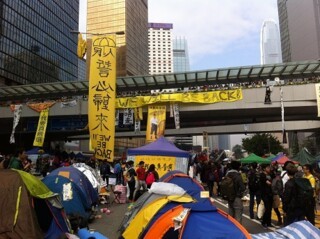In Hong Kong
Anna Aslanyan
It looked like the last day of term outside Hong Kong's Admiralty station this morning as dozens of youngsters carried their rucksacks, boxes and blankets to the entrance. Across the road it lookedlike the last day of Glastonbury, people packing up their tents or sitting around. The main site of Occupy Central, a movementdemanding ‘genuine universal suffrage’ for the 2017 Hong Kong election, was being cleared after 74 days of civil disobedience.
The occupiers were given notice on Tuesday, when the High Court of Hong Kong served an injunction against persons attempting ‘to prevent or obstruct normal vehicular traffic from passing the area’.It had been taken out by All China Express Limited, a bus company whose operations had been affected by the protests. Waiting for the injunction to be delivered, I talked to a group of studentstaking their graduation pictures against a banner – ‘We'll be back’ – and posing under a yellow umbrella, the symbol of the movement. They said they used to come to the protest after class andweren't worried about being found out.
A first aid worker told me about the police tear gas attack on 28 September. ‘The worst is when they mix gas with water. You have to burn all your clothes afterwards.’ Most protesters agreed tokeep the movement peaceful, but that didn’t suit everyone. ‘It's too peaceful for me,’ a young man with an injured arm said. ‘When they come here with their loudspeakers we have to put up a fight.’He told me that, apart from opposing Beijing's right to vet Hong Kong election candidates, he was against mainlanders in general. ‘They come here to steal from us, to price us out of everywhere.And they don't even speak our language. Where are you from? London? Well then, you've got the same problem with Bulgarians.’ I knew that anti-Chinese sentiment was rife in Hong Kong, but didn'trealise the Ukip agenda had made it to the former British colony.
I came to a junction flanked by recently erected roadblocks. A group of journalists dashed to one of them and waited for an approaching trio: two men and a woman with a carrier bag. The taller manstood aside supervising the proceedings, the woman took a plastic folder out of her bag and handed it to the shorter one, who taped it to the post. The injunction was finally up. The officialsmoved on, repeating the procedure. At the last roadblock the shorter man gave the tape one final twist and shook his colleague's hand. Then he put his hands together and bowed, asking the paparazzito let him through.
I saw him again this morning: he was retracing his steps, this time accompanied by about thirty other bailiffs. They waited at each roadblock – one had a banner stretched over it with the words‘It's just the beginning’; another, ‘Clear the obstacles to true democracy first’ – while a team of workers dismantled it. A few dozen police officers brought up the rear; more waited in vansparked around the area. The bailiffs started work at 9 a.m., and by lunchtime were still several barricades away from the centre of the site, where the Hong Kong Federation of Students was holdinga final sit-in.
As the police made their slow progress, departing activists gave away supplies they couldn't take with them: water, hard hats, goggles. Chelsea, a final-year student reading social policy, wasrolling up the tent in which she had spent a month. ‘During this time we had open lectures in a nearby park: they were really useful,’ she said. ‘Now it's over we need to find new forms ofconfrontation.’
A few university professors were walking around the camp in academic gowns. ‘We are here to prevent any violence,’ John Tse said. Shu Kei told me some of his students had already applied fordeferment, and he would make sure they would be allowed to continue their studies. Martin Lee, a prominent campaigner and former legislator, joined the sit-in but remained standing. Po Chung Chow,a professor of philosophy at the Chinese University of Hong Kong, had been the first to lecture to the protesters. His talk in September on ‘Democracy and Human Dignity’ was attended by 2000people. He was confident the movement would come up with new tactics soon: ‘This is our first civil action organised on such a scale; we're still learning.’ He said the system had to be made moredemocratic before social injustice could be tackled. When I mentioned the public being fed up with the disruption caused by the protests, he said he hoped they would be able to understand theactivists: ‘This is the price we have to pay.’ He promised to stay there till the end: ‘I'm ready to get arrested. It's going to be my first time.’
The police gave the protesters one warning after another. The first deadline was 11 a.m.; then everyone had to leave in an orderly fashion by 2 p.m.; the arrests didn't start until after 4 p.m. andwere met with little resistance. By 5.30 p.m. forty people had been arrested, Lee and Chow among the first; it took the police another three and a half hours to clear the site, arresting 209protesters in total (things sped up once they started working in batches) and taking down the details of further 909 people. A dozen trucks were brought to the emptied encampment to remove thedebris, including yellow ribbons tied to railings, umbrellas and banners. Passing the station, I saw a familiar message on a wall: ‘We will be back.’
